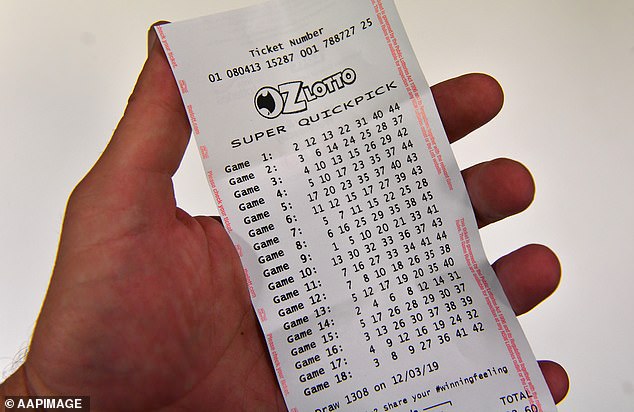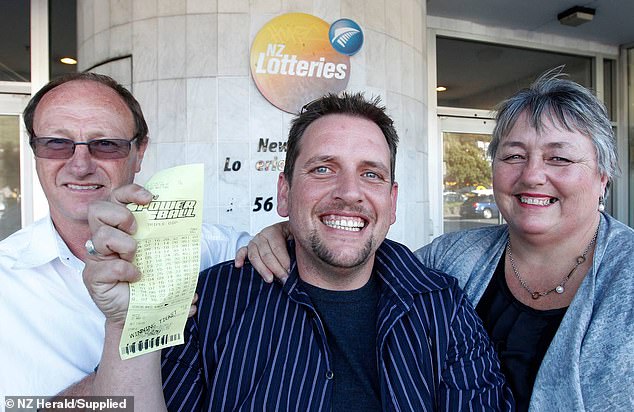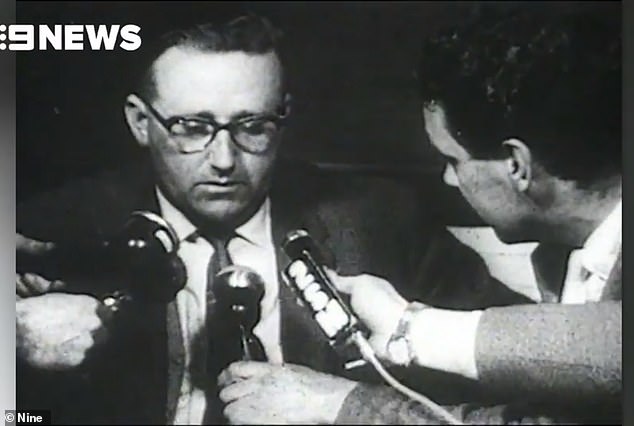Powerball jackpot surges to $100million: How big wins can bring bad fortune
As Australians calculate their lucky numbers for Thursday’s $100 million Powerball draw, they should be aware that winning such a huge prize could ruin some people’s lives rather than improve them.
While we can daydream about how to spend the lottery jackpot, some previous winners saw their windfall turn into a nightmare.
In a thread on Reddit, users shared stories of how winning the lottery had disastrous consequences for their friends and family.
“My uncle won in 2014 and he left the country because my aunt started telling everyone. It ruined my family,” they said.
‘My parents received phone calls every day from relatives wanting to know where my uncle was.
‘A few years later I went on a trip and false rumors spread that my uncle was financing my life’.
They hadn’t spoken to him since he left the country and had no idea if he was still alive.
Australians have taken to social media to describe how winning the Lotto has torn their families apart (pictured is a Lotto newsagents worker)
“How much does it cost to break up a family? $5-10 million,” they said.
A second added: ‘A girl’s family I went to high school with won $10 million about 20 years ago I think. She never really talked about it because it tore her family apart.’
A third person told the story of a family friend who won millions in the 1990s, leading to bankruptcy and financial ruin.
“I have a family friend who won Division One in the mid-90s. About $8 million at the time,” they explained.
“In short, they lost everything. And when I say they lost everything, I mean they went bankrupt.”
In another case, the adult children were disgruntled after their father won a large lottery prize.
‘My ex-wife had an uncle who won $4m. The money caused so much trouble for the family. The adult children complained that they weren’t getting enough.
“Last I heard, they waited until their mother died to get the inheritance. I never thought they could be so a********.”
Another Australian told of a family member who won $1.5 million and lost most of it within days.
‘One of them won $1.5 million, got great advice, structured his business and would make a good living for the rest of his life.
‘But a week later he spent $240,000 on a new Range Rover, $150,000 on a new M4 Convertible for his wife, $150,000 on a caravan and six months later he was back working on his mobile fish and chip trailer.’
A fifth said: ‘My cousin’s girlfriend won $75,000 about ten years ago. She bought an expensive, powerful car and immediately wrote it off before she bothered to insure it.’
Another disturbing story involves an Australian woman who won $22 million, only to be exploited by her long-lost brother.
In six months, the brother managed to scam the lottery winner out of $7 million.
The requests started with a new car, followed by a vacation, and then moved on to a new home and a business to break the FIFO system.
‘When the final payment was made, she never heard from him again. She was quite simple and only bought a four-bedroom house in the suburbs and a new Commodore – it was sad because she really thought she had rekindled their relationship.’
An exceptionally lucky Australian won the lottery not once, but twice.
However, after the victories things turned dramatic.
‘He literally peed most of it against the wall. Now married with kids and wishes they had at least used it for a house and not the Brock edition Commodore he wrapped around a tree on the way home from the pub.’
Another said, “Our window cleaner at the time was making about $100,000, which was a pretty penny back then.

Australians spend an average of $1.9 billion a year on lottery
“He went to Thailand and took a younger woman. Tried to get her PR and it turned out she had HIV and had infected him as well. He then moved to Thailand to be with her.”
While these stories highlight the negative consequences of Lotto winnings, some Australians also shared positive experiences.
“A friend of my father-in-law won millions, bought a cattle ranch and had the best time of his life,” one of them said.
“I was a local banker at a branch in a small town, and a woman in her fifties who was a customer of mine had won a large sum of money,” said another.
“She enjoyed her life, and she was happy afterward.”
A third person shared a positive story about his boyfriend’s childhood friend, who won $800,000 about 15 years ago.
‘He put the money in a high-interest savings account, bought a house that he rented out while he was still living with his mother (he was 19), and hasn’t worked a day since.
‘Apparently he sat down with a financial advisor and they arranged it so that he could draw a very modest ‘salary’ each month, without this having too much impact on his accrued interest.
“He now owns several properties after making some smart investments in the stock market and continues to prosper. Wife, three kids, happy days. He’s a nice guy.”
According to a report by Gambling Statistics Australia, Australians spend an average of $1.9 billion per year on Lotto tickets.




